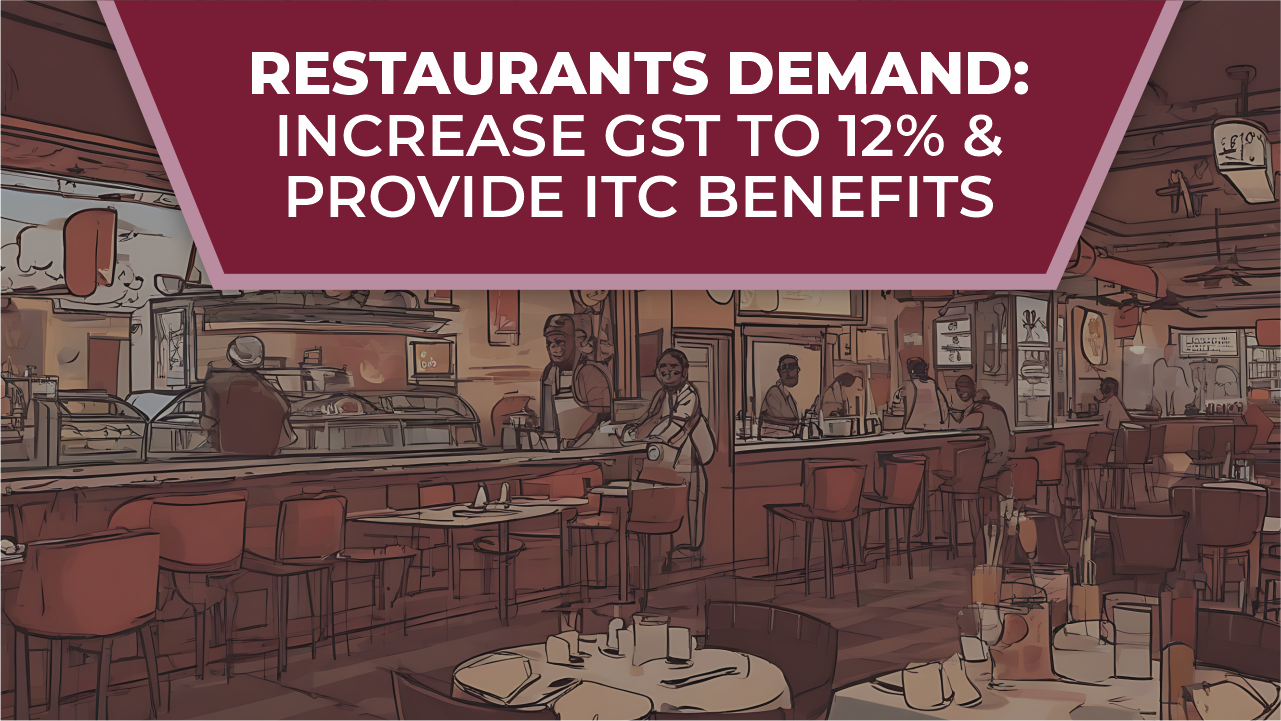NRAI Urges Government to Restore Input Tax Credit and Increase GST Rate to 12% for Restaurants

NRAI Urges Government to Restore Input Tax Credit and Increase GST Rate to 12% for Restaurants
The National Restaurant Association of India (NRAI) has taken a bold stance ahead of the Union Budget, advocating for significant changes in the tax structure and policies affecting the restaurant industry. In a bid to level the playing field for restaurants, delivery partners, and consumers, the NRAI has called for the restoration of input tax credit (ITC) and an increase in the Goods and Services Tax (GST) rate from the current 5% to 12%. This move, they believe, will not only support the industry’s growth but also contribute to the nation’s economic development.
The Road to Recovery: Restaurants’ Resilience During the Pandemic
The restaurant industry was among the hardest-hit sectors during the pandemic. Nevertheless, it showcased remarkable resilience and is now on a steady path to recovery. The NRAI believes that with the right policy and budgetary support in the upcoming Union Budget, the industry can accelerate its growth, unlocking its full potential as a significant contributor to both government revenue and employment generation.
The Call for GST Input Tax Credit Restoration
The NRAI emphasizes that the restaurant industry is unique in being subjected to a 5% GST rate without the benefit of ITC. This, they argue, was designed to prevent cascading taxation, but its absence not only diminishes operating margins but also significantly increases capital budget requirements for new projects.
In a bid to address this issue, the NRAI suggests a tiered approach, based on revenue slabs. While smaller businesses can continue under the current GST provisions, larger, more organized players with higher revenues and capital expenditure can transition to the proposed GST regime.
Unlocking the Industry’s Potential: NRAI’s Vision
Kabir Suri, President of the NRAI, highlights the immense potential of India’s food services industry. It not only contributes significantly to government revenue but also ranks among the largest employers in the country. Balanced, fair, and equitable policies, such as restoring GST input tax credit, rationalizing licensing norms, and addressing e-commerce policies, can not only benefit businesses and consumers but also fuel overall economic growth and employment opportunities.
E-commerce Policy and Industry Status
The NRAI acknowledges the convenience brought by online platforms but raises concerns about fair competition and equitable growth. They also seek an “industry status” for the food services sector, which would bring numerous benefits, including easier finance, special schemes, subsidies, and streamlined clearance processes. This recognition could foster entrepreneurship and enterprise in the industry.
Rationalization of Licenses and Subsidy Schemes
The NRAI calls for a rationalization of licenses and No Objection Certificates (NOCs), as restaurants often require 15-25 licenses/NOCs to operate. This complexity hampers growth beyond core geographies and adds operational burdens.
Additionally, the NRAI proposes targeted subsidy schemes and access to debt financing for Small and Medium-sized Enterprises (SMEs). These measures aim to reduce operational costs, especially in smaller towns and cities, by subsidizing essential ingredients, utilities, and waste management.
Extended Working Hours and Eco-friendly Packaging
Lastly, the NRAI recommends extended working hours for the restaurant sector, aligning with the changing dynamics of consumer preferences. They also suggest a reduction in GST on eco-friendly materials like bagasse, commonly used as packaging material for home delivery, to promote sustainability.
In conclusion, the NRAI’s proactive approach in advocating for policy changes and support measures in the restaurant industry reflects its commitment to fostering growth, ensuring fair competition, and contributing to India’s economic progress. As the Union Budget approaches, the industry eagerly awaits potential changes that could shape its future.
